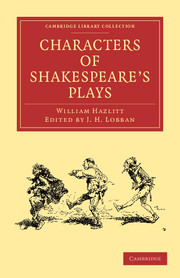Book contents
- Frontmatter
- Preface
- Contents
- Introduction
- Preface
- Cymbeline
- Macbeth
- Julius Cæsar
- Othello
- Timon of Athens
- Coriolanus
- Troilus and Cressida
- Antony and Cleopatra
- Hamlet
- The Tempest
- The Midsummer Night's Dream
- Romeo and Juliet
- Lear
- Richard II
- Henry IV
- Henry V
- Henry VI
- Richard III
- Henry VIII
- King John
- Twelfth Night; or, what you will
- The Two Gentlemen of Verona
- The Merchant of Venice
- The Winter's Tale
- All's Well That Ends Well
- Love's Labour's Lost
- Much Ado About Nothing
- As You Like It
- The Taming of the Shrew
- Measure for Measure
- The Merry Wives of Windsor
- The Comedy of Errors
- Doubtful plays of Shakespear
- Poems and Sonnets
- Notes
Lear
Published online by Cambridge University Press: 07 September 2010
- Frontmatter
- Preface
- Contents
- Introduction
- Preface
- Cymbeline
- Macbeth
- Julius Cæsar
- Othello
- Timon of Athens
- Coriolanus
- Troilus and Cressida
- Antony and Cleopatra
- Hamlet
- The Tempest
- The Midsummer Night's Dream
- Romeo and Juliet
- Lear
- Richard II
- Henry IV
- Henry V
- Henry VI
- Richard III
- Henry VIII
- King John
- Twelfth Night; or, what you will
- The Two Gentlemen of Verona
- The Merchant of Venice
- The Winter's Tale
- All's Well That Ends Well
- Love's Labour's Lost
- Much Ado About Nothing
- As You Like It
- The Taming of the Shrew
- Measure for Measure
- The Merry Wives of Windsor
- The Comedy of Errors
- Doubtful plays of Shakespear
- Poems and Sonnets
- Notes
Summary
We wish that we could pass this play over, and say nothing about it. All that we can say must fall far short of the subject; or even of what we ourselves conceive of it. To attempt to give a description of the play itself or of its effect upon the mind, is mere impertinence; yet we must say something.— It is then the best of all Shakespear's plays, for it is the one in which he was the most in earnest. He was here fairly caught in the web of his own imagination. The passion which he has taken as his subject is that which strikes its root deepest into the human heart; of which the bond is the hardest to be unloosed; and the cancelling and tearing to pieces of which gives the greatest revulsion to the frame. This depth of nature, this force of passion, this tug and war of the elements of our being, this firm faith in filial piety, and the giddy anarchy and whirling tumult of the thoughts at finding this prop failing it, the contrast between the fixed, immoveable basis of natural affection, and the rapid, irregular starts of imagination, suddenly wrenched from all its accustomed holds and resting-places in the soul, this is what Shakespear has given, and what nobody else but he could give.
- Type
- Chapter
- Information
- Characters of Shakespeare's Plays , pp. 119 - 136Publisher: Cambridge University PressPrint publication year: 2009First published in: 1908

